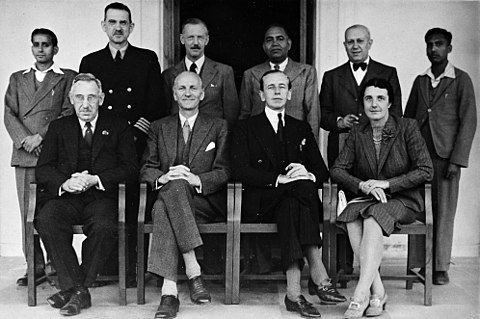John Alfred Ryle

John Alfred Ryle (born December 12, 1889 in Brighton , † February 27, 1950 in Sussex ) was a British doctor.
Live and act
Born in Brighton as the son of doctor RJ Ryle, he trained at Brighton College and studied medicine at Guy's Hospital , graduating in 1912. With the rank of captain, he served in the Royal Army Medical Corps in France and Belgium from 1914 to 1919. He then returned to Guy's Hospital as an assistant doctor, where he was elected prosector in pathology in 1920. He became known through well-founded scientific studies in the fields of gastrointestinal diseases and cardiovascular diseases . In 1932 he became a Doctor of the Royal Household and in 1936 he was appointed the King's Extraordinary Doctor.
Cambridge
From 1935 to 1942, Ryle Regius was Professor of Physic at Cambridge . For some time he turned more and more politically to the left and became a pacifist and anti-fascist. He supported the republican movement in Spain, in particular by helping refugees. In 1940 he applied in vain for a seat in parliament. He intensively promoted the concerns of the “Anglo-Soviet Medical Committee”, of which he was a founding member.
Oxford
In 1943 he was appointed professor of social medicine at Nuffield College , Oxford . Ryle was one of the first to question the usefulness of medicine that was more concerned with healing than preventing disease. His solution was to re-establish medicine as a humanistic science and to break it away from exclusively apparatus medicine, which at that time was of course not yet called that.
Bhore Committee
In the autumn of 1944, Ryle was invited by the Indian colonial government to tour the country with a group of foreign doctors and analyze the structures of the local health care system. This analysis served the Indian «Bhore Committee», which was founded in 1943 by Sir Joseph William Bhore (1878–1960), as an argumentation aid for a report completed in 1946 with recommendations for the development of a structured health system in India.
Works
- Together with A. Stokes and WH Tytler. Weil's disease (Spirochaetosis ictero-haemorrhagica) in the British Army in Flanders . In: The Lancet , January 27, 1917 (digitized version)
- The natural history of disease . Oxford University Press, Oxford 1936, 2nd edition 1948 (digitized version)
- Forty years of physiology and pathology. In: Backgroud to modern science. Ten lectures at Cambridge arranged by the History of Science Committee 1936. Cambridge University Press 1938, pp. 145–166 (digitized version )
- Fears may be Liars . 1941
- Social Medicine . In: British Medical Journal, June 27, 1942, p. 801
- Changing Disciplines: Lectures on the History, Method, and Motives of Social Pathology . Oxford University Press, Oxford 1948
literature
- FAE crew. John Alfred Ryle . In: British Journal of Social Medicine, Volume 4 (3); 1950, pp. 172-173
- Dorothy Porter. John Ryle: Doctor of Revolution? In: Doctors, politics and society: historical essays. Edited by Dorothy Porter and Roy Porter. Radopi, Amsterdam & Atlanta 1993, pp. 247-274, ISBN 9789051835106
Individual evidence
- ↑ Henry E. Sigerist. The Johns Hopkins Institute of the History of Medicine during the academic year 1944-1945. … III Field Work in Canada and India. In: Bulletin of the History of Medicine. Johns Hopkins Press, Baltimore, Volume 18 (1945), p. 231
- ^ Henry E. Sigerist: Report on India. In: Milton I. Roemer (Ed.): Henry E. Sigerist on the Sociology of Medicine. MD Publications, New York 1960, pp. 288-296.
| personal data | |
|---|---|
| SURNAME | Ryle, John Alfred |
| BRIEF DESCRIPTION | British doctor |
| DATE OF BIRTH | December 12, 1889 |
| PLACE OF BIRTH | Brighton |
| DATE OF DEATH | February 27, 1950 |
| Place of death | Sussex |